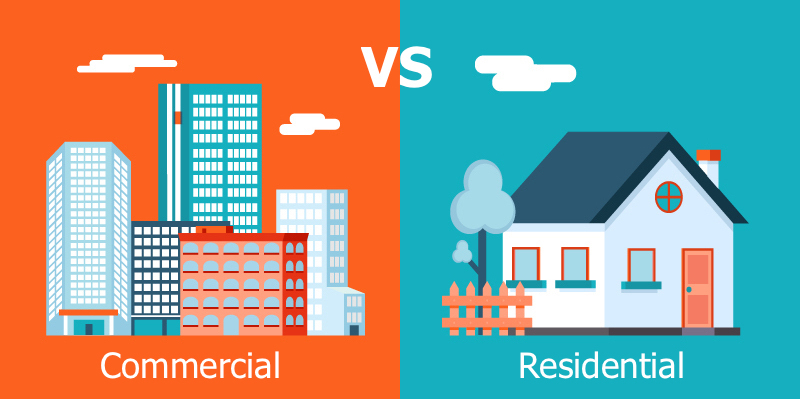Commercial vs Residential Real Estate: Which is Right for You in 2025?

When it comes to investing in property, one of the biggest questions every investor faces is: Should I choose commercial or residential real estate?
Both segments have their own benefits, risks, and returns. With the Indian property market evolving rapidly—especially in booming regions like Gurugram, Noida, Mumbai, and Pune—understanding the difference between commercial and residential real estate is crucial before taking the plunge.
In this blog, we’ll break down the key differences, returns, risks, and future trends so you can make the right property investment decision in 2025.
1. Understanding the Basics: What Is Commercial vs Residential Real Estate?
Before diving into returns and trends, let’s define them:
Residential Real Estate includes properties where people live—like apartments, villas, plots, and townhouses. Buyers usually invest for personal use, rental income, or long-term capital appreciation.
Commercial Real Estate (CRE) includes income-generating properties like office spaces, retail shops, warehouses, and co-working hubs. Investors typically look for higher rental yields, corporate tenants, and long-term leases.
In 2025, India’s real estate sector is expected to reach $1 trillion by 2030, with commercial spaces contributing a significant share due to the boom in IT, e-commerce, and co-working demand. But does that mean CRE is always better? Not necessarily—your goals and risk appetite matter.
2. The Investment Perspective: Returns & Risks

One of the most common reasons investors debate commercial vs residential real estate is the difference in returns and risk.
Residential Real Estate: Stable but Moderate Returns
Rental Yield: Typically 2–4% annually in India.
Capital Appreciation: 6–10% per year in high-growth areas (like Dwarka Expressway, Gurugram, Pune).
Risk: Lower, as housing demand is constant. Even in slowdowns, residential properties tend to hold value.
Liquidity: Higher, as more buyers exist for homes.
Commercial Real Estate: High Returns but Higher Risk
Rental Yield: 6–12% annually, often double or triple residential yields.
Capital Appreciation: 8–15% in growing business hubs (like Gurugram, Hyderabad, Bangalore).
Risk: Market cycles, tenant defaults, and higher entry costs can impact ROI.
Liquidity: Lower than residential, as fewer buyers and longer selling periods.
Key Takeaway:
Choose residential if you want steady appreciation, lower entry costs, and quick exit.
Choose commercial if you seek high rental income, long-term leases, and can handle risks.
3. Entry Cost and Maintenance: What Investors Should Know
Another factor when choosing commercial vs residential real estate is the initial investment and upkeep.
Residential properties are more affordable, with ticket sizes starting from ₹40–50 lakhs in major cities (for mid-segment homes). Maintenance costs are low, especially in ready-to-move flats.
Commercial properties often require ₹1 crore+ entry capital, along with higher maintenance and fit-out costs, but also generate longer, fixed lease incomes.
For NRIs or first-time investors, residential is typically the starting point. Experienced or institutional investors often diversify into commercial for portfolio growth.
4. Tax Benefits & Compliance in 2025
Taxation also impacts your decision.
Residential real estate allows deductions on home loan interest (Section 24) and principal repayment (Section 80C), plus benefits on capital gains reinvestment (Section 54).
Commercial properties offer depreciation benefits and expenses like maintenance, interest, and property taxes can be claimed as business expenses.
However, GST applies to commercial properties (for rental income exceeding ₹20 lakh/year), whereas residential rental income is often tax-free up to ₹2.5 lakh annually.
5. Future Trends: Which Will Grow More by 2030?
The choice between commercial vs residential real estate also depends on emerging market trends.
Residential Real Estate Trends
Demand for affordable and mid-segment housing (₹40–80 lakh range) is surging due to urban migration.
Branded residences by global chains like Marriott and Hilton are attracting HNIs and NRIs.
Government incentives for first-time buyers and smart city projects are boosting growth.
Commercial Real Estate Trends
Co-working spaces and Grade A offices remain in high demand due to hybrid work culture.
Warehousing and logistics parks are booming thanks to e-commerce and manufacturing growth.
Institutional investors are pouring funds into REITs (Real Estate Investment Trusts) for steady income.
By 2030, experts predict both sectors will grow, but commercial spaces may deliver higher rental yields, while residential will remain a safe, liquid asset class.
6. Pros and Cons: Quick Comparison Table
| Aspect | Residential Real Estate | Commercial Real Estate |
|---|---|---|
| Rental Yield | 2–4% per year | 6–12% per year |
| Capital Appreciation | 6–10% annually (in growth zones) | 8–15% annually (business hubs) |
| Risk Level | Low to moderate | Moderate to high |
| Liquidity | High (easier to sell) | Low (longer to sell) |
| Entry Investment | Starts from ₹40–50 lakhs | Usually ₹1 crore+ |
| Best For | First-time buyers, NRIs, steady investors | Experienced investors, institutional buyers |
7. Which Should You Choose?
There’s no one-size-fits-all answer. Your decision between commercial vs residential real estate depends on:
Investment goal (rental income vs long-term appreciation)
Budget (affordable entry vs high capital)
Risk tolerance
Market knowledge (commercial requires expertise)
For many investors, a balanced portfolio—with one or two residential properties for liquidity and a commercial asset for income—offers the best results.
8. Final Thoughts
The debate on commercial vs residential real estate comes down to your investment goals, financial capacity, and risk appetite. While commercial can deliver high rental income, residential offers stability and liquidity—both can play vital roles in a diversified property portfolio.
In 2025, as India’s economy grows and urban hubs like Gurugram, Pune, Bangalore, and Dwarka Expressway thrive, both segments are set for strong growth. The key is to align your property investment strategy with market trends and professional advice.
9. FAQs on Commercial vs Residential Real Estate
Q1: Which gives better returns, commercial or residential?
Commercial real estate typically gives higher rental yields (6–12%) compared to residential (2–4%), but with higher risk and capital requirements.
Q2: Is commercial property good for NRIs?
Yes. Many NRIs prefer Grade A offices or retail spaces for steady rental income, especially via REITs or managed properties.
Q3: Which is easier to sell?
Residential properties are easier to sell due to a wider buyer pool.
Q4: What is better for beginners?
For first-time investors, residential properties are usually more manageable.
